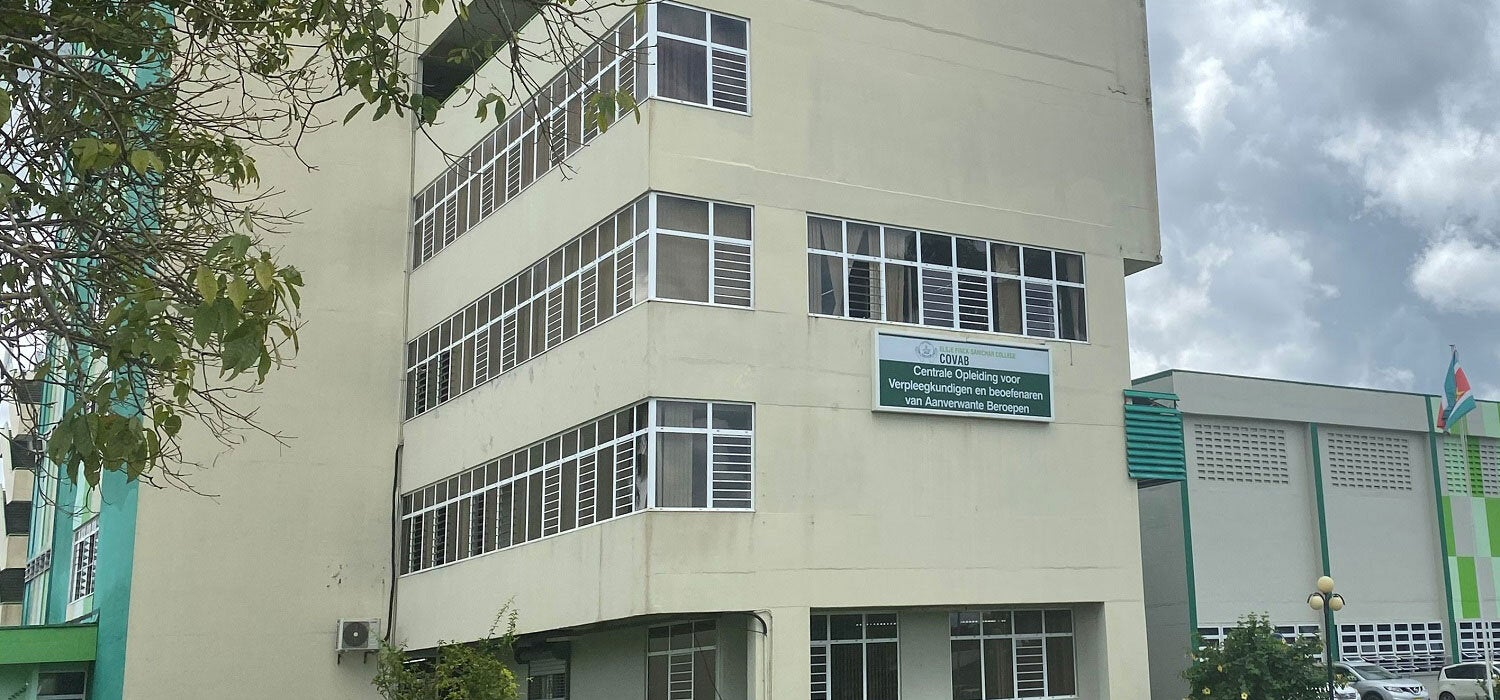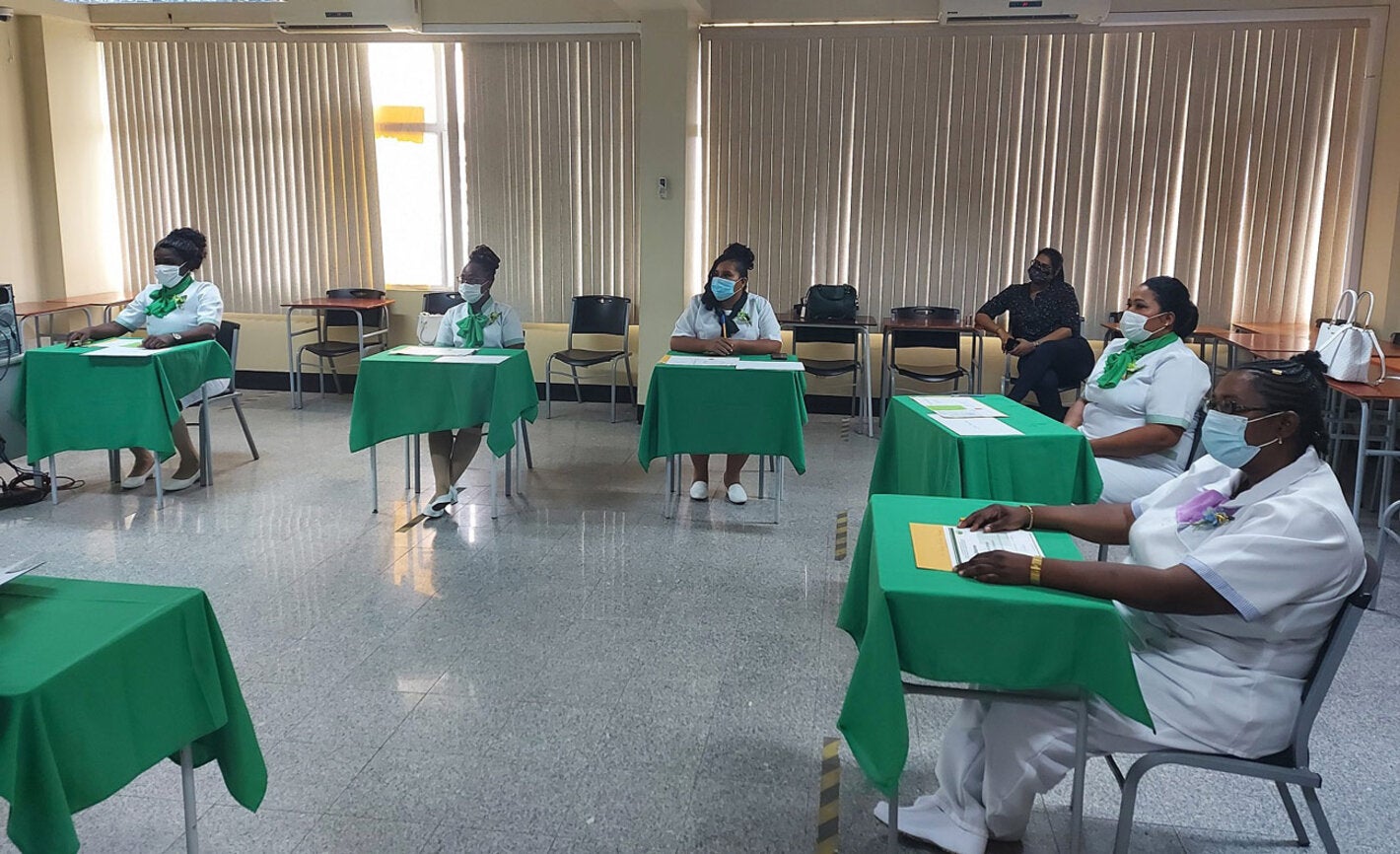How has education at COVAB changed since the pandemic hit Suriname?
“When the first COVID-19 case was confirmed in March 2020, COVAB removed all its students from healthcare institutions to assess the situation and generate next steps”, Mrs. Bamoeje tells us. A 3-week holiday was announced for the students and during that time, our management team and Director worked towards a solution to continue all educational tracks at COVAB so the students would not get behind on their studies. The college decided to implement distance-learning and on April 14th, 2020, we started offering classes online using Microsoft Teams. All planned exams, were taken online, including the final presentation by the students. Farzana (Mohamad) was in one of the first batches of students that completed their educational track with COVAB online.
“We as students were very happy with this quick response and sustainable solution by COVAB, and didn’t experience any delay”, added Ms. Mohamed.
“Because of distance-learning, I along with many other students found that this also created opportunities for us to work in addition to studying, which was a bit more difficult before, with the face-to-face classes.”
How has the organization adapted to distance-learning and what are the constraints in terms of distance-learning?
“Converting an institution that has always operated in-person to digital teaching methods is always difficult – the right software and enough hardware (computers) being of the utmost importance. Therefore, we were incredibly grateful that PAHO donated equipment for distance-learning such as laptops and cameras to our institution. When the OpenWHO courses for healthcare staff launched in English, we implemented an active participation policy for these courses, making them mandatory for our students. The language barrier was deemed a challenge in many instances however for both students and staff."
"After the courses had been translated and offered in Dutch by PAHO/WHO however, the participation rate went up and we received many positive responses from both staff and students alike”, explained Mrs. Bamoeje.
We implemented the use of Microsoft Teams throughout our organizations and offered “learning packages” to our students consisting of (handouts of) PowerPoint presentations, materials, and class planning. The Dean would regularly check up on the students, and if they informed us that they did not have access to internet we arranged an allowance of 50 SRD per day to activate internet on their phones or invited them to use COVAB’s Wi-Fi on site.
Getting our staff, as well as freelance educators, proper training to teach online, came with certain challenges. Digital literacy proved to be an issue in some instances, and with more than 300 teachers, providing the training, to work with distance-learning tools was quite challenging at times.
“Some students found it difficult to study in their own time, because holding oneself accountable and responsible is not everyone’s strong suit”, Ms. Mohamed elaborated, “But I do think it also helps to develop these skills, so it’s certainly not a negative development in my opinion. The OpenWHO courses are also very easily accessed through a mobile application, making them very user-friendly. Time management during this hectic period, was also crucial and what helped a lot is that the OpenWHO courses can be finished in parts. So, if I had to work one day and would only be able to complete 2 hours of a 4-hour course, I could finish the last 2 hours another day.”
How have the translated OpenWHO courses from English to Dutch impacted your organization? Is there a certain success story you would like to share?
“Language was definitely a barrier at first and we found that most people did not want to or were not able to participate in the courses in English. This changed after the courses got translated”, said Mrs. Bamoeje. As participation went up, and the courses could be finished by the students independently, the teachers had more time to prepare on other segments of education. The students simply had to provide their certificates of the completed mandatory courses.
“For me, the certificates I obtained through the OpenWHO COVID-19 response courses on topics such as PPE, COVID-19 patient care, and vaccination training helped me not only expand on essential knowledge and training during the pandemic, but also helped me and other students get temporary jobs at the vaccination sites. As a recent graduate, the Director of a hospital where I got hired as a nurse practitioner, also specifically applauded these additional courses on my CV and I’m sure other graduates will also experience, or have also had similar experiences when applying for jobs”, added Ms. Mohamed. “Because the OpenWHO courses not only cover how to administer the vaccinations, but also broader knowledge such as storage, proper handling etc., I noticed that at the vaccination sites, I was entrusted with more responsibility than those that had not followed these courses. The OpenWHO courses are very thorough.”
Looking back at a little over a year of COVID-19 in Suriname, how has PAHO contributed to helping your organization better manage this health emergency?
“PAHO has significantly contributed towards the improvement of our education through the continuous support of distance-learning, by providing material and courses. We’ve talked about the OpenWHO courses but let me add to that. On June 14th, our specialized education track started, and our students that live in District Nickerie, who previously had to travel all the way to Paramaribo to participate in the courses, have now been able to follow the courses at the COVAB facility in Nickerie, with laptops and material provided by PAHO. Students, both in Paramaribo and Nickerie are also able to borrow these laptops for studying or completing assignments at home.
In addition, the OpenWHO courses are not only beneficial for COVAB, but for healthcare in general in Suriname. We share the courses with our colleagues from other healthcare institutions, with our alumni, with our freelance and part-time teachers, to further help spread the essential knowledge to better respond to the COVID-19 crisis”, Mrs. Bamoeje elaborated.
PAHO/WHO launched the OpenWHO landing page for Suriname in May 2021, making the courses in Dutch even more accessible to local healthcare students and professionals.


